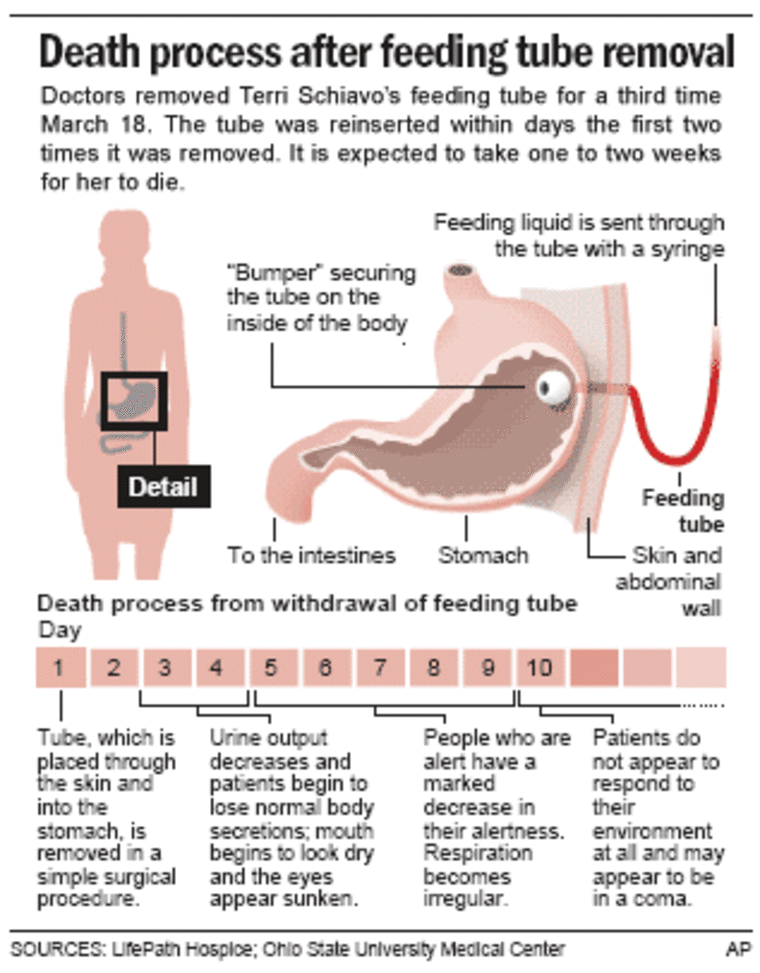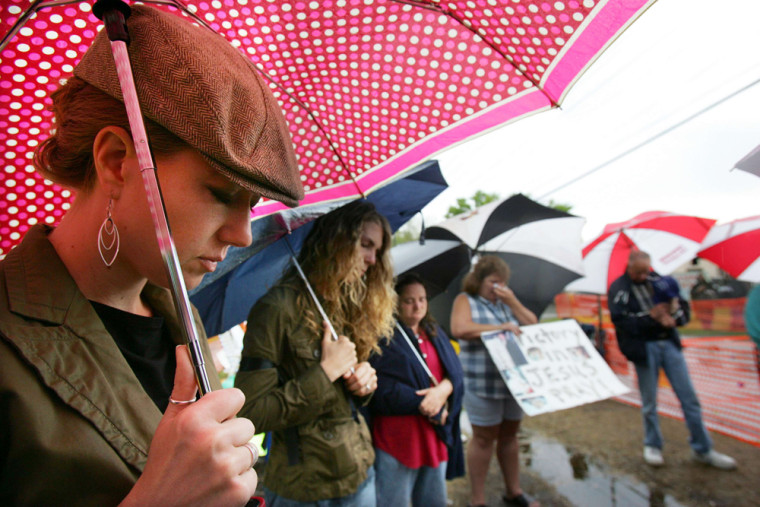Terri Schiavo’s parents made a desperate appeal to the Supreme Court late Wednesday, asking justices to order resumption of nourishment for their severely brain-damaged daughter.
In the emergency filing, Bob and Mary Schindler say their 41-year-old daughter faces an unjust and imminent death based on a decision by her husband to remove a feeding tube without strong proof of her consent. They alleged constitutional violations of due process and religious freedom.
The filing also argues Congress intended for Schiavo’s tube to be reinserted, at least temporarily, when it passed an extraordinary bill last weekend that gave federal courts authority to fully review her case.
Time is of the essence. Schiavo’s feeding tube was removed last Friday and doctors have said she likely would die within a week or two at a hospice in Pinellas Park, Fla.
The filing is seen as a long shot. The Supreme Court has declined other opportunities to get involved in the Schiavo case and legal experts say there is little reason to believe justices will intervene this time.
No timetable
The Schindlers’ request goes first to Justice Anthony Kennedy, a Reagan appointee who has staked a moderate position on social issues. He has the option to act on the petition alone or refer it to the entire court, which he did on the last emergency request involving Schiavo.
There was no immediate word when the Supreme Court might act on the petition.
Earlier in the day, the 11th U.S. Circuit Court of Appeals denied a request by Schiavo's parents to rehear her case, leaving as a last judicial option the high court.
Republican leaders in Congress also were preparing arguments for the Supreme Court in support of the parents.
In Florida, meanwhile, Gov. Jeb Bush tried to build support for Schiavo's parents by saying new evidence suggests her condition was misdiagnosed, even though doctors have said for years that Schiavo is severely brain-damaged and in a persistent vegetative state. His legal effort to gain custody of Schiavo was also rebuffed in court.
Republicans in the Florida Senate tried to pass a law that would prohibit patients like Schiavo from being denied food and water if they didn’t express their wishes in writing, but their effort was defeated.
The state Senate vote Wednesday came after a bitter debate, with Terri Schiavo’s brother, Bobby Schindler, watching from the gallery above the floor. He covered his eyes with his hands and lowered his head during the debate.
“I’m here pleading for mercy. Have mercy on Theresa Marie Schiavo,” said bill sponsor Sen. Dan Webster, a Republican.
But Senate Democratic Leader Les Miller warned: “By the time the ink is dry on the governor’s signature, it will be declared unconstitutional, just like it was before.”
The 10-2 ruling by the entire federal appeals court came just 12 hours after a three-judge panel from the same court ruled against the parents. Schiavo's husband, Michael Schiavo, has consistently convinced courts that she would not have wanted to be kept alive in her condition.
The ruling was the latest legal blow for Schiavo’s parents as their daughter’s life hangs in the balance.
‘Please let my daughter live’
Supporters of Schiavo’s parents grew increasingly dismayed, and 10 protesters were arrested outside her hospice for trying to bring her water.
“When I close my eyes at night, all I can see is Terri’s face in front of me, dying, starving to death,” Mary Schindler said outside the Pinellas Park hospice. “Please, someone out there, stop this cruelty. Stop the insanity. Please let my daughter live.”
Jeb Bush and Florida’s social services agency filed a petition in state court to take custody of Schiavo and, presumably, reconnect her feeding tube. It cites new allegations of neglect and challenges Schiavo’s diagnosis as being in a persistent vegetative state. The request is based on the opinion of a neurologist working for the state who observed Schiavo at her bedside but did not conduct an examination of her.
The long-shot custody request by Bush was made before Judge George Greer, the same judge who has presided over the case for several years and issued the ruling last month that allowed the feeding tube to be removed. Greer planned to decide by noon Thursday on whether the case would go forward.
But Ronald Cranford of the University of Minnesota, a neurologist who was among those who made a previous diagnosis of Schiavo, said “there isn’t a reputable, credible neurologist in the world who won’t find her in a vegetative state.”
The three-judge panel, in a 2-1 ruling issued overnight, said the parents “failed to demonstrate a substantial case on the merits of any of their claims” that the feeding tube should be reinserted immediately. Terri Schiavo began her fifth full day without the tube, which has kept her alive for more than a decade.
"We also conclude that the district court’s carefully thought out decision to deny temporary relief in these circumstances is not an abuse of discretion," Judges Ed Carnes and Frank Hull wrote in the majority opinion.
“There is no denying the absolute tragedy that has befallen Mrs. Schiavo,” the ruling said. “We all have our own family, our own loved ones, and our own children. However, we are called upon to make a collective, objective decision concerning a question of law.”
In his dissent, Judge Charles Wilson said Schiavo’s “imminent” death would end the case before it could be fully considered. “In fact, I fail to see any harm in reinserting the feeding tube,” he wrote.
On Tuesday, a federal judge in Tampa also rejected the parents’ emergency request.
President Bush, who along with congressional Republicans has taken a stand in support of Schiavo's parents, reiterated Wednesday that "in a case such as this, the legislative branch, the executive branch, ought to err on the side of life, which we have. Now we'll watch the courts make their decisions."
Supreme Court appeal is last one
While the Supreme Court has declined to hear the case previously in appeals from state court rulings; what makes it different this time is that the appeal would come from a federal ruling.
Howard Simon of the American Civil Liberties Union of Florida said the ruling pointed out the limited role of government in these matters and the need for a living will “to keep politicians out of your personal life.”
“While I anticipate that the Supreme Court will have to decide whether to get into it, I do think we are coming to the end of this sad case,” he said.

The Supreme Court’s history on right-to-die cases is pretty thin. It ruled in 1990 that a terminally ill person has a right to refuse life-sustaining treatment. In its next term, it plans to consider whether the federal government can prosecute doctors who help ill patients die.
Between those cases, the court has chosen to allow states to decide the issue.
The Schindlers have been locked for years in a battle with Schiavo’s husband over whether her feeding tube should be disconnected. State courts have sided with Michael Schiavo, who insists his wife told him she would never want to be kept alive artificially.
‘A horrific intrusion’
Even before the parents’ appeal was filed with the 11th Circuit, Michael Schiavo urged the court not to grant an emergency request to restore nutrition.
“That would be a horrific intrusion upon Mrs. Schiavo’s personal liberty,” said the filing by his attorney, George Felos. He filed a response to the Schindlers’ appeal and said he would go to the Supreme Court if the tube were ordered reconnected.
Terri Schiavo suffered brain damage in 1990 when her heart stopped briefly from a chemical imbalance believed to have been brought on by an eating disorder. Court-appointed doctors say she is in a persistent vegetative state with no hope of recovery.
Her parents argue that she could get better and that she would never have wanted to be cut off from food and water.
Parents see 'significant decline'
Florida lawmakers previously have failed to pass legislation that could have prevented the removal of the tube. They may consider another bill Wednesday, but state Sen. Daniel Webster said he has yet to persuade any lawmakers to change their votes.
In court documents, the Schindlers said their daughter began “a significant decline” late Monday.
“While she still made eye contact with me when I spoke to her, she was becoming increasingly lethargic,” Bob Schindler said in the papers. “Terri no longer attempted to verbalize back to me when I spoke to her.”
By late Tuesday, her eyes were sunken and her skin, lips and tongue were parched, said Barbara Weller, an attorney for the Schindlers. The hospice has refused to provide details about her condition.
Demonstrators who gathered outside Terri Schiavo’s hospice here decried the courts’ decisions. About a dozen people stood in front Wednesday to bring water to Schiavo, but police arrested most of them.
“This is a clear cut case of judicial tyranny. All the judges who have ruled against Terri are tyrants, and we fully expected this decision,” said Tammy Melton, a high school teacher from Monterey, Tenn.
For some, Congress ‘overstepped’
But Richard Avant, who lives down the street from the hospice, carried a sign reading “Honor her wishes.”
“We represent the silent majority, if you look at the polls,” Avant said. “We agree that Congress overstepped their bounds.”
Republican leaders in Congress refused to give up entirely Wednesday. In legal papers prepared for filing at the Supreme Court, they argued that the 11th Circuit had “failed to adhere to the plain meaning” of the emergency legislation.
The legislation required that a new, independent evaluation of her case be made, according to papers filed for House Speaker Dennis Hastert of Illinois, Majority Leader Tom DeLay and others. They said it also required the courts to “ensure that desperately needed nutritional support” is provided to Schiavo while the review is conducted.
Over the weekend, Republicans in Congress pushed through unprecedented emergency legislation aimed at prolonging Schiavo’s life by allowing the case to be reviewed by federal courts.
On Tuesday, U.S. District Judge James Whittemore rejected the parents’ request to have the tube reinserted, saying they had not established a “substantial likelihood of success” at a trial on their claim that Schiavo’s religious and due process rights have been violated.
